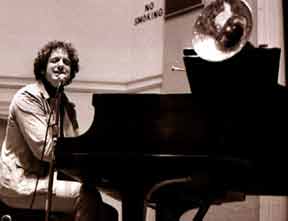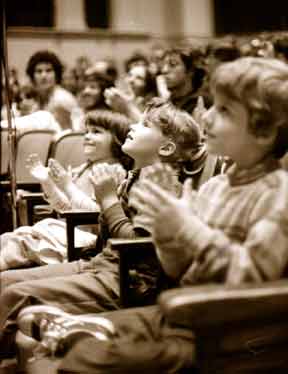

|
|
ALSO
CHECK OUT
No More Walls: A Conversation with David Amram
 |
 |
Can we ask Bill Duckworth, of the Music Department at Bucknell University, to pass along our thanks to Charles and Isabella Kushell?
The generosity of these two Bucknell U. alumni has made possible a year-long series of "New Music," at their alma mater, beginning with John Cage, including Milton Babbitt and Roger Hannay (the Music Department even got in the spirit of things, adding Roger Morris and Michael Hurd to the calendar), and triumphantly concluding on April 15, 1977, with an audience-inspired free jazz concert with David Amram and his Jazz Quintet – plus the Bucknell Celestial Choir, the Bucknell Jazz Ensemble (with the best whistler I’ve heard since Al Jolson), the Bucknell Percussion Choir, and the entire audience as Mystery Guests.
In short, it was a ball, as audiences the world over have come to expect from concerts including David Amram as conductor and performer. The program began with Amram’s music for Jack Kerouac’s movie, "Pull My Daisy," featuring Pepper Adams on a lovely old baritone sax, and Amram in an updated lecture on Kerouac’s place in contemporary American literature, delivered scat-singing style and ad lib.
Then "Tompkins Square Consciousness Expander" began to float the audience up and out into space on the wings of Amram’s twin tin whistles and their own cross-rhythmic chanting, as conducted by the maestro, of course.
Beaver Harris gave a spectacular drumming demonstration on Dizzy Gillespie’s "Night in Tunisia," ably abetted by Ray Mantilla, on his gigantic congas and a whole table-ful of exotic percussion instruments.
"Alfred the Hog," which David introduced as a demonstration of "the urban influences of jazz and Latin music on rural American bluegrass" – in other words, "crabgrass, with its roots in suburbia" – featured Bucknell’s Chris Sievens on a banjo that, for once was drowned out by the other instruments, from normal bluegrass patterns, but then the unexpected had by this time become commonplace in this Amram-created universe.
The "Sioux Rabbit Song," which Floyd Westerman taught to David, had the strange thunder of the congas replacing the tom-toms, and the audience chanting and bouncing in its seats by now, ready for "Brazilian Memories," when Amram divided them into "voices," and conducted them in polyrhythmic cross-clapping that gave new dimensions to the term, "audience participation."
And it was further extended by the "Bucknell On the Spot Blues," an improvisation from suggestions thrown up on stage by different "voices" – would you believe Shakespeare, Ex-Lax, and avocadoes? – woven into a poem on the beauties of people by David Amram, in the end. It’s not the sort of thing you can explain easily to someone who wasn’t there. And maybe that’s the best argument for making sure you get there yourself the next time, right?
The evening wound up with everyone chanting – again, polyrhythmically, of course – the Swahili farewell that David learnt when he was in Nairobi, Kenya, a year ago, acting as official "Community Music Maker" for the World Council of Churches. Let us hope that "Ka-Hare" translates as "Au revoir" rather than "Goodbye"!
By the way – for those of you who might like to try importing some of the concerts high points into your own living-rooms – though of course you’ll also need a horde of willing friends for the Mystery Guests parts – "Pull My Daisy," "Brazilian Memories," and "Tompkins Square Consciousness Expander" are all on the RCA double-album, No More Walls, along with David Amram’s music for Joseph Papp’s Shakespeare in the Park Festival, "Shakespearean Concerto," and his music for Arthur Miller’s "After the Fall." If you can’t find the album – it may be out of print by now – just wait a few months, and it will be re-issued, this time on Flying Fish Records as "One World of Music," Vols. One, Two, Three, etc. And then you can hold that party!